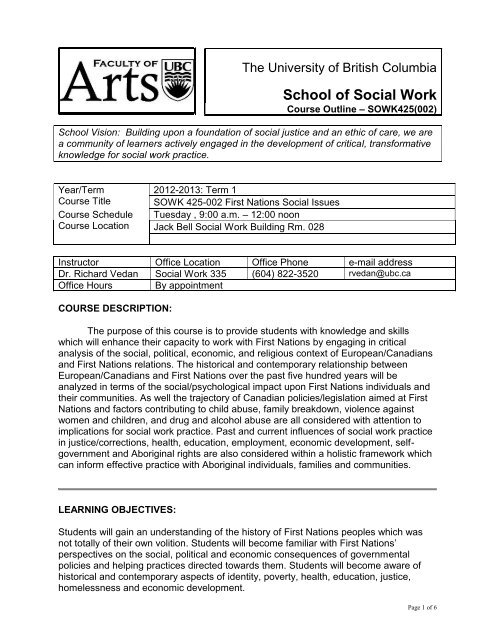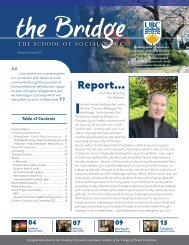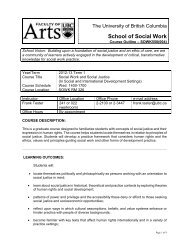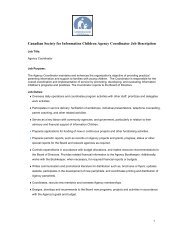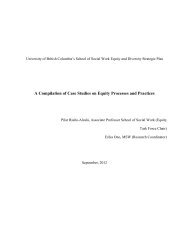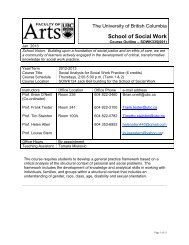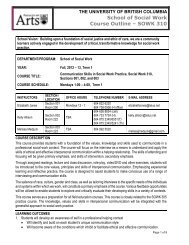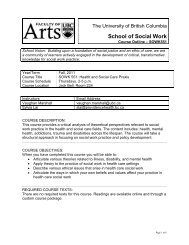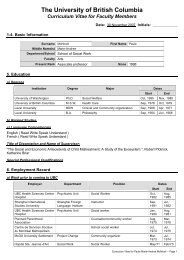Course Outline Format - School of Social Work - University of British ...
Course Outline Format - School of Social Work - University of British ...
Course Outline Format - School of Social Work - University of British ...
You also want an ePaper? Increase the reach of your titles
YUMPU automatically turns print PDFs into web optimized ePapers that Google loves.
The <strong>University</strong> <strong>of</strong> <strong>British</strong> Columbia<strong>School</strong> <strong>of</strong> <strong>Social</strong> <strong>Work</strong><strong>Course</strong> <strong>Outline</strong> – SOWK425(002)<strong>School</strong> Vision: Building upon a foundation <strong>of</strong> social justice and an ethic <strong>of</strong> care, we area community <strong>of</strong> learners actively engaged in the development <strong>of</strong> critical, transformativeknowledge for social work practice.Year/Term 2012-2013: Term 1<strong>Course</strong> Title SOWK 425-002 First Nations <strong>Social</strong> Issues<strong>Course</strong> Schedule Tuesday , 9:00 a.m. – 12:00 noon<strong>Course</strong> Location Jack Bell <strong>Social</strong> <strong>Work</strong> Building Rm. 028Instructor Office Location Office Phone e-mail addressDr. Richard Vedan <strong>Social</strong> <strong>Work</strong> 335 (604) 822-3520 rvedan@ubc.caOffice Hours By appointmentCOURSE DESCRIPTION:The purpose <strong>of</strong> this course is to provide students with knowledge and skillswhich will enhance their capacity to work with First Nations by engaging in criticalanalysis <strong>of</strong> the social, political, economic, and religious context <strong>of</strong> European/Canadiansand First Nations relations. The historical and contemporary relationship betweenEuropean/Canadians and First Nations over the past five hundred years will beanalyzed in terms <strong>of</strong> the social/psychological impact upon First Nations individuals andtheir communities. As well the trajectory <strong>of</strong> Canadian policies/legislation aimed at FirstNations and factors contributing to child abuse, family breakdown, violence againstwomen and children, and drug and alcohol abuse are all considered with attention toimplications for social work practice. Past and current influences <strong>of</strong> social work practicein justice/corrections, health, education, employment, economic development, selfgovernmentand Aboriginal rights are also considered within a holistic framework whichcan inform effective practice with Aboriginal individuals, families and communities.LEARNING OBJECTIVES:Students will gain an understanding <strong>of</strong> the history <strong>of</strong> First Nations peoples which wasnot totally <strong>of</strong> their own volition. Students will become familiar with First Nations’perspectives on the social, political and economic consequences <strong>of</strong> governmentalpolicies and helping practices directed towards them. Students will become aware <strong>of</strong>historical and contemporary aspects <strong>of</strong> identity, poverty, health, education, justice,homelessness and economic development.Page 1 <strong>of</strong> 6
SOWK425(002) 2012-2013Students will gain perspective that will enable them to situate themselves with respectto the historical and contemporary circumstances <strong>of</strong> First Nations peoples in urban andrural settings.COURSE OBJECTIVES:1. Critically analyze the impact <strong>of</strong> European political, social, and economic policiesand religious efforts on First Nations people.2. Critically analyze the strengths and weaknesses <strong>of</strong> major European/Canadianlegislation and policies that have been and are currently directed at First Nationspeople.3. Critically analyze the “diversity <strong>of</strong> experiences” that First Nations people havehad in their relationship with European/Canadian society.4. Critically analyze the historical and current roles <strong>of</strong> social workers as well asimplications for practice.5. Identify barriers to and strategies for effective social work with First Nations.6. Apply principles <strong>of</strong> a holistic approach to social work practice with First Nations inthe above analysis.7. Assess the appropriateness <strong>of</strong> interventions aimed at First Nations.REQUIRED COURSE TEXTS:Fournier, S. and Crey, E., (1997) Stolen from our embrace. Vancouver , B.C.:Douglas and McIntyre.Frideres, James S. and Rene R. Gadacz, (2012) Aboriginal Peoples in Canada:Contemporary Conflicts. Ninth Edition. Toronto: Prentice-Hall Canada Inc.SUPPLEMENTARY READINGS:York, Ge<strong>of</strong>frey, (1990) The dispossessed: Life and death in Native Canada. London:Vintage.Adams, H., (1995) A tortured people: The politics <strong>of</strong> colonization.Penticton, B.C.: Theytus Books Ltd.Haig-Brown, C., (1991). Resistance and renewal: Surviving the Indian residentialschool . Vancouver: Tillicum Library Arsenal Pulp Press Ltd.EVALUATION:Evaluation will be based upon:(a) Midterm paper 35%(b) Participation 10%Page 2 <strong>of</strong> 6
SOWK425(002) 2012-2013(c) <strong>Outline</strong> for major paper 15%(d) Essay 40%All written work must be submitted in APA format, and only hard copies will beaccepted.(a) Midterm paper: 35 marks For this assignment you are asked to record yourthoughts and feelings as you read and discuss each chapter <strong>of</strong> the Fournier and Creytext: how and if you relate to certain characters and situations, and does what you arelearning experiencing affect the rest <strong>of</strong> your life. Some examples <strong>of</strong> an entry may be: “Ifelt frustrated by the section on policy because policy seems to be too impersonal, and Iam more <strong>of</strong> a person-interacting type,” or “I felt really angry at Native youth for throwingaway their lives by using alcohol and committing suicide,” or “I felt really sad becausethere has been so much oppression for Native people and it reminded me <strong>of</strong> my ownoppression.”Students are encouraged to devote at least 15-20 minutes, or two handwritten pages,to entries following each class. The use <strong>of</strong> the individual journal is not intended as atherapeutic tool for students, rather it should be thought <strong>of</strong> as an instrument <strong>of</strong> personalenlightenment which will assist you to further define and refine your practice and policydevelopment skills. In other words, it should get you in touch with First Nations peoples’experience by understanding your own.Bases upon the content <strong>of</strong> at least five journal entries provide and analysis regardinghow you will integrate the above into your <strong>Social</strong> <strong>Work</strong> practice. For example how doyou think your observations and reactions might influence your practice generally andwith First Nations peoples specifically? An eight to ten page paper on the abovematerial is due on or before Friday, October 26, 2012 at 4:30 PM(b) Participation: 10 marksIn accordance with UBC policy students are expected to attend all classes. Studentsare expected to be active participants in their own education and to come to classprepared to engage in discussions based upon completion <strong>of</strong> assigned readings.(c) <strong>Outline</strong> for major paper: 15marksAn outline that defines: the topic to be addressed, the main ideas to be included, thesequence <strong>of</strong> the points to be made and that indicates the conceptual framework to beused as the basis for analysis and discussion, is to be submitted no later than Tuesday,November 01, 2011 at 4:30 pm. The outline will serve as basis <strong>of</strong> discussion in ameeting with the instructor regarding your major paper.(d) Major Essay: 40 marksFocussing upon a topic <strong>of</strong> your choice your paper will examine a contemporary socialissue impacting First Nation individuals and communities within the context <strong>of</strong> thehistorical events that have influenced their lives over the past five hundred years.Information should be drawn from the course texts and other relevant publications.Page 3 <strong>of</strong> 6
SOWK425(002) 2012-2013Analysis should integrate your worldview, your personal understanding <strong>of</strong> the nature <strong>of</strong>human behaviour development and the development <strong>of</strong> social problems.A paper, 16 to 20 pages in length is due on or before Friday, December 07, 2012 at4:30 pm.OUTLINE AND READINGS:1. Sept. 11/12 Classroom introductions, overview <strong>of</strong> course and expectationsPre-contact, culture and socialization.Section one the microcosmic case perspective2. Sept. 18/12 Guest speaker Dr. Shelly Johnson at Sty Wet Tan FNHL 9am -12pmRead Family Under Siege/Residential <strong>School</strong> ImpactRequired Readings:Fournier & Crey: Chapters one and two3. Sept. 25/12 Guest speaker Dr. Lee Brown at Sty Wet Tan FNHL 9am-12pmChild Welfare/Fetal Alcohol SyndromeRequired ReadingsFournier & Crey: Chapters three and six4. Oct. 02/12 View Kanehsatake : 270 Years <strong>of</strong> Resistance on-lineNational Film Board www.onf-nfb.gc.caRead Sexual Abuse and HealingRequired Readings:Fournier & Crey: Chapters four and five.5. Oct. 09/11 Children’s FutureRequired Readings:Fournier & Crey: Chapter sevenGuest speakers Suzanne Fournier and Ernie CreySection two the macrocosmic perspective6. Oct. 16/12 The context <strong>of</strong> European and First Nations relationsRequired Readings:Frideres & Gadacz: Chapters 1 & 27. Oct. 23/12 Population and Health: <strong>Social</strong> Pr<strong>of</strong>ileRequired Readings:Frideres & Gadacz: Chapter 38. Oct. 30/12 Demographics, Education and Employment: <strong>Social</strong> Pr<strong>of</strong>ilePage 4 <strong>of</strong> 6
SOWK425(002) 2012-2013Required Readings:Frideres & Gadacz: Chapter 49. Nov. 06/12 City Life and Gender Issues/ Aboriginal Organizations & AANDRequired Readings:Frideres & Gadacz: Chapters 5 & 610. Nov.13/12 First Nations:Treaties &Land ClaimsRequired Readings:Frideres & Gadacz: Chapters 711. Nov. 20/12 The MetisRequired Readings:Frideres & Gadacz: Chapters 812. Nov. 27/12 Self determination and self-government; Inuit and the creation <strong>of</strong>NunavutRequired Readings:Frideres & Gadacz: Chapters 9 &10COURSE POLICIES [attendance, participation, academic dishonesty]:Excerpt from the UBC calendar:Regular attendance is expected <strong>of</strong> students in all their classes (including lectures, laboratories, tutorials, seminars,etc.). Students who neglect their academic work and assignments may be excluded from the final examinations.Students who are unavoidably absent because <strong>of</strong> illness or disability should report to their instructors on return toclasses.The <strong>University</strong> accommodates students with disabilities who have registered with the Disability Resource Centre.The <strong>University</strong> accommodates students whose religious obligations conflict with attendance, submittingassignments, or completing scheduled tests and examinations. Please let your instructor know in advance,preferably in the first week <strong>of</strong> class, if you will require any accommodation on these grounds. Students who plan tobe absent for varsity athletics, family obligations, or other similar commitments, cannot assume they will beaccommodated, and should discuss their commitments with the instructor before the drop date.It is recommended that students retain a copy <strong>of</strong> all submitted assignments (in case <strong>of</strong> loss) and should also retainall their marked assignments in case they wish to apply for a Review <strong>of</strong> Assigned Standing. Students have the rightto view their marked examinations with their instructor, providing they apply to do so within a month <strong>of</strong> receiving theirfinal grades. This review is for pedagogic purposes. The examination remains the property <strong>of</strong> the university.Academic Dishonesty:Please review the UBC Calendar “Academic regulations” for the university policy on cheating, plagiarism, and otherforms <strong>of</strong> academic dishonesty. Also visit www.arts.ubc.ca and go to the students’ section for useful information onavoiding plagiarism and on correct documentation.ASSIGNMENTSSubmitting Assignments-Students can use the drop box located by <strong>of</strong>fice 116 to submit their assignments or any correspondence to faculty,sessionals or staff. Items will be date-stamped and distributed to the appropriate mailbox throughout the day.Return <strong>of</strong> marked student assignments -Instructors coordinate the return <strong>of</strong> marked assignments. The options are as follows: a) the instructor returns thepaper to students in class; b) if the paper has been submitted electronically, the instructor will mark it on-line (withPage 5 <strong>of</strong> 6
SOWK425(002) 2012-2013track changes) and return to the student on-line; c) the instructor returns the paper to the student by snail mail (thestudent provides a self-stamped, addressed envelope to the instructor). Marked papers not returned by any <strong>of</strong> theoptions above will be held by the instructor. Marked papers will no longer be put in a box outside the instructor’s<strong>of</strong>fice or at the main <strong>of</strong>fice counter.Late assignments-GRADING CRITERIA:LetterGradeA+AA-B+BB-C+CC-PercentRange90-10085-8980-8476-7972-7568-7164-6760-6355-59Mid-Point95878277.583.569.565.562.557Represents work <strong>of</strong> exceptional quality. Content, organization and style are allat a high level. Student demonstrates excellent research and reference toliterature where appropriate. Also, student uses sound critical thinking, hasinnovative ideas on the subject and shows personal engagement with the topic.Represents work <strong>of</strong> good quality with no major weaknesses. Writing is clearand explicit and topic coverage and comprehension is more than adequate.Shows some degree <strong>of</strong> critical thinking and personal involvement in the work.Good use <strong>of</strong> existing knowledge on the subject.Adequate and average work. Shows fair comprehension <strong>of</strong> the subject, but hassome weaknesses in content, style and/or organization <strong>of</strong> the paper. Minimalcritical awareness or personal involvement in the work. Adequate use <strong>of</strong>literature.D 50-54 52 Minimally adequate work, barely at a passing level. Serious flaws in content,organization and/or style. Poor comprehension <strong>of</strong> the subject, and minimalinvolvement in the paper. Poor use <strong>of</strong> research and existing literature.F 0-49 Failing work. Inadequate for successful completion <strong>of</strong> the course or submittedbeyond final date <strong>of</strong> acceptance for paper.<strong>Course</strong> format will include a weekly learning circle. Students are expected to be ontime, to avoid disruption during the circle, which will start at the beginning <strong>of</strong> each class.Except for occasions when guest speaker are in attendance you are expected tocontribute to the learning <strong>of</strong> the group through your reflections, by discussing relevanceto social work practice.Attendance is required, and students missing more than three classes will not be ableto submit their final paper for grading in accordance with <strong>University</strong> calendar statementsregarding attendance.Page 6 <strong>of</strong> 6


